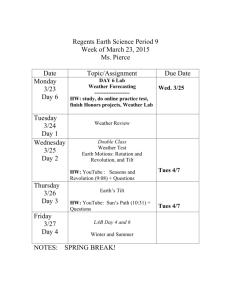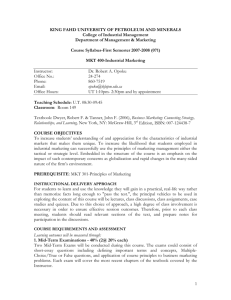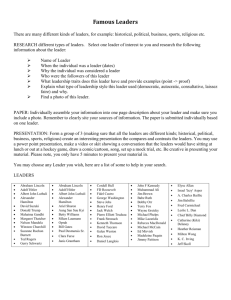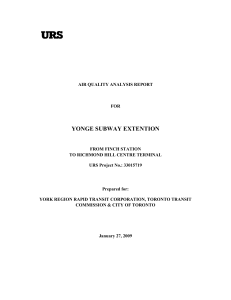Department of Political Science
advertisement
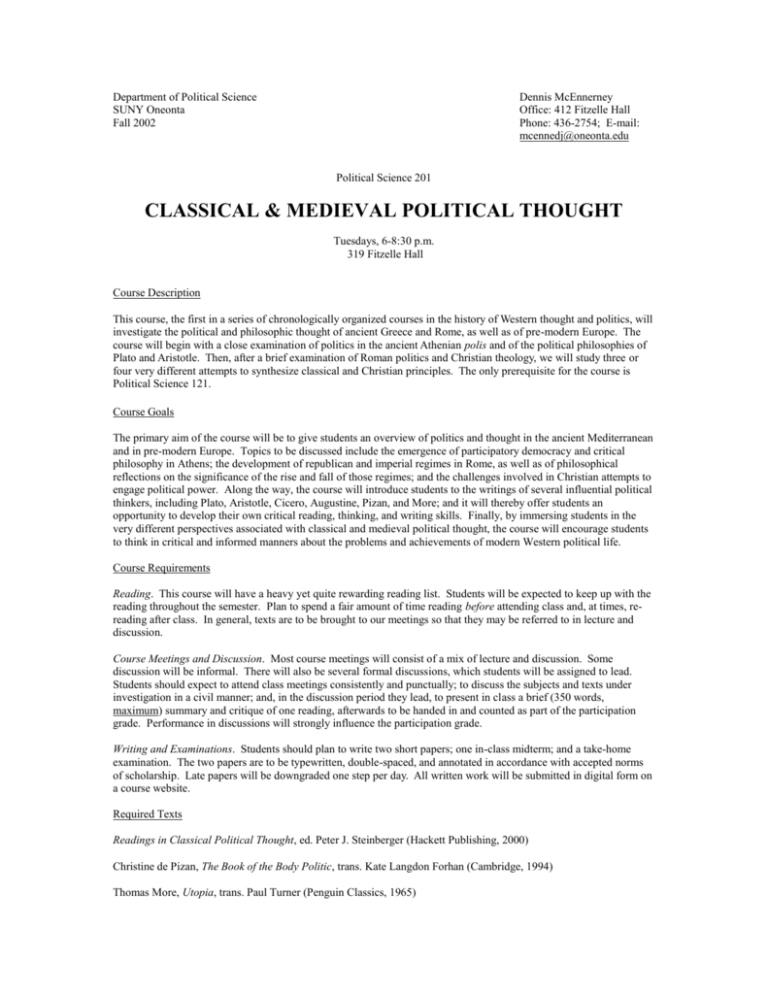
Department of Political Science SUNY Oneonta Fall 2002 Dennis McEnnerney Office: 412 Fitzelle Hall Phone: 436-2754; E-mail: mcennedj@oneonta.edu Political Science 201 CLASSICAL & MEDIEVAL POLITICAL THOUGHT Tuesdays, 6-8:30 p.m. 319 Fitzelle Hall Course Description This course, the first in a series of chronologically organized courses in the history of Western thought and politics, will investigate the political and philosophic thought of ancient Greece and Rome, as well as of pre-modern Europe. The course will begin with a close examination of politics in the ancient Athenian polis and of the political philosophies of Plato and Aristotle. Then, after a brief examination of Roman politics and Christian theology, we will study three or four very different attempts to synthesize classical and Christian principles. The only prerequisite for the course is Political Science 121. Course Goals The primary aim of the course will be to give students an overview of politics and thought in the ancient Mediterranean and in pre-modern Europe. Topics to be discussed include the emergence of participatory democracy and critical philosophy in Athens; the development of republican and imperial regimes in Rome, as well as of philosophical reflections on the significance of the rise and fall of those regimes; and the challenges involved in Christian attempts to engage political power. Along the way, the course will introduce students to the writings of several influential political thinkers, including Plato, Aristotle, Cicero, Augustine, Pizan, and More; and it will thereby offer students an opportunity to develop their own critical reading, thinking, and writing skills. Finally, by immersing students in the very different perspectives associated with classical and medieval political thought, the course will encourage students to think in critical and informed manners about the problems and achievements of modern Western political life. Course Requirements Reading. This course will have a heavy yet quite rewarding reading list. Students will be expected to keep up with the reading throughout the semester. Plan to spend a fair amount of time reading before attending class and, at times, rereading after class. In general, texts are to be brought to our meetings so that they may be referred to in lecture and discussion. Course Meetings and Discussion. Most course meetings will consist of a mix of lecture and discussion. Some discussion will be informal. There will also be several formal discussions, which students will be assigned to lead. Students should expect to attend class meetings consistently and punctually; to discuss the subjects and texts under investigation in a civil manner; and, in the discussion period they lead, to present in class a brief (350 words, maximum) summary and critique of one reading, afterwards to be handed in and counted as part of the participation grade. Performance in discussions will strongly influence the participation grade. Writing and Examinations. Students should plan to write two short papers; one in-class midterm; and a take-home examination. The two papers are to be typewritten, double-spaced, and annotated in accordance with accepted norms of scholarship. Late papers will be downgraded one step per day. All written work will be submitted in digital form on a course website. Required Texts Readings in Classical Political Thought, ed. Peter J. Steinberger (Hackett Publishing, 2000) Christine de Pizan, The Book of the Body Politic, trans. Kate Langdon Forhan (Cambridge, 1994) Thomas More, Utopia, trans. Paul Turner (Penguin Classics, 1965) 2 Grading and Attendance Policies Grades will be assigned on an 100-point scale and weighted in the following manner: 1. 2. 3. 4. 5. 6. 7. 8. First paper thesis statement First paper (3-4 pages) In-class midterm Second paper thesis statement Second paper draft (4-6 pages) Second paper final version Take-home final examination Participation Tues., 10 Sept. Tues., 24 Sept. Tues., 15 Oct. Tues., 5 Nov. Tues., 12 Nov. Tues., 19 Nov. Tues., 17 Dec. TOTAL: 1% 15% 20% 1% 3% 20% 25% 15% 100% Regular, timely attendance is mandatory. Unexcused absences and tardiness will be noted and will affect grades negatively. After two unexcused absences, your grade will drop one step (for example, from a B+ to a B). Each subsequent absence will lower your grade two steps. Four or more unexcused absences may result in a failing grade or involuntary withdrawal from the course. Tardiness will also be noted. After the third late arrival, every instance of tardiness will be treated as an absence. Course meetings are few and brief, so be there and be on time. If you have a good reason to be absent or late, notify me in writing as soon as possible, explaining and documenting your absence. Either give me a note in class or send me an e-mail message. I will notify you if I accept your explanation, or if we need to talk more about it during my office hours. The schedule of exams and papers appears above and below. You will be expected to meet all of these deadlines. Exceptions will be made only in extreme and unavoidable circumstances. If you expect to miss an exam or submit a paper late, contact me immediately. Either attend my office hours, or give me a note or an e-mail message explaining your circumstances. Plan to attend class for the whole period, focusing on coursework throughout. If you have a good reason for arriving late or leaving early, please notify me in advance in writing (e-mail is best). If you cannot notify me in advance, do so as soon as you can afterwards. All students are required to attend class during the final examination period. As a courtesy to all, please turn off pagers and telephones while in class. Note that this entire syllabus is subject to change at the discretion of the instructor. Office Hours/Communication I will hold regular office hours on Mondays from 5:15-6:15 p.m., Tuesdays from 1:30-2:30 p.m., and Wednesdays from 1-2 p.m., in my office at 412 Fitzelle Hall. I can also make appointments at other times and on other days, if necessary. My telephone number is 436-2754. Notes can be left for me in my mailbox at the Political Science/Sociology Office, 418 Fitzelle Hall. E-mail messages can also be sent to me at: mcennedj@oneonta.edu 3 SCHEDULE OF MEETINGS, TOPICS, AND ASSIGNMENTS Note: All assignments are to be completed before class. RCPT = Readings in Classical Political Thought. 1. Tues., 27 August Citizenship and Truth-Telling in the Polis Introduction Class: Tues., 3 September Introduction to the course. On the Household and the Polis (1) Reading: Sophocles, Antigone, in RCPT, pp. 117-35. Philosophy on Trial Reading: Plato, Apology, in RCPT, pp. 147-59. Assignment: First paper topics distributed. Tues., 10 September Discussion 1 / Socratic Citizenship? Reading: Plato, Crito, in RCPT, pp. 159-65. Paper Workshop Assignment: Thesis statement due in class. Tues., 17 September FIRST FALL BREAK – Enjoy a long weekend! 2. Philosophical Truth Confronts Politics Tues., 24 September Socrates' Attack on Sophism Reading: Plato, Republic, Book I, in RCPT, pp. 166-81. Education and Justice in the Household-Republic Reading: Republic, Book II, in RCPT, pp. 181-96. Assignment: First papers due. Tues., 1 October Discussion 2 / The Household-Republic Reading: Republic, Books III- V471b, in RCPT, pp. 196-241. Truth and Philosophy Reading: Republic, Books V471c-VII, in RCPT, pp. 241-76. 4 Tues., 8 October The Art of Philosophy Reading: Republic, Book X, in RCPT, pp. 303-17. Discussion 3 & Review 3. The Naturalistic Truth of the Polis Tues., 15 October MIDTERM EXAMNATION On the Household and the Polis (2) Reading: Tues., 22 October Aristotle, Politics, Book I, in RCPT, pp. 377-84. Discussion 4 / On Citizenship and Theory Reading: Politics, Books II-IV, in RCPT, pp. 384-405. Poleis and Revolution Reading: Tues., 29 October Politics, Books V-VI, in RCPT, pp. 405-21. The Good State and Education Reading: Politics, Books VII-VIII, in RCPT, pp. 421-42. Discussion 5 Reading: Review Plato, Republic, and Aristotle, Politics, in RCPT. Assignment: Second paper topics distributed. 4. The Theological Vision Confronts Natural Law and Politics Tues., 5 November Roman Stoicism Reading: Cicero, The Republic, in RCPT, pp. 446-62. Discussion 6 / Roman Politics, Neo-Platonic Philosophy, and Christian Morality Reading: Augustine, in RCPT, pp. 463-81. Assignment: Thesis statement due in class. Tues., 12 November Discussion 7 / Belief and the Body Politic Reading: Augustine, in RCPT, pp. 481-504. Paper Workshop Assignment: Drafts of second paper due in class. 5 Tues., 19 November Aristotle, Natural Law, and Christian Kings Reading: Aquinas, in RCPT, pp. 508-46. Discussion 8 Assignment: Second paper due. Tues., 26 November The Godly Rule, the Prince and the Interdependent Community Reading: Pizan, Book of the Body Politic, pp. 3-110. Discussion 9 THANKSGIVING – Enjoy the holiday! Tues., 3 December The Power of the Tudors / The Nonsense of Philosophy and Politics Reading: Thomas More, Utopia, Introductory Letters, Books One & Two, pp. 3-85. Discussion 10 / Summary and Review Assignment: Take-home final examination distributed Tues., 10 December NO CLASS – FOLLOW THURSDAY SCHEDULE Tues., 17 December FINAL EXAMINATION, 6 p.m. Assignment: Take-home final examination due in class.

